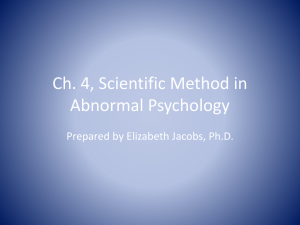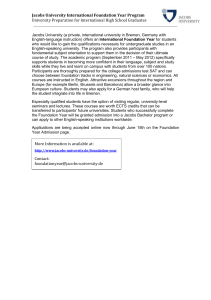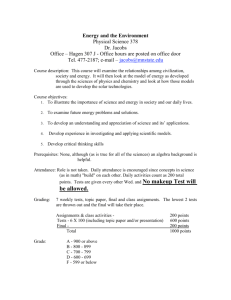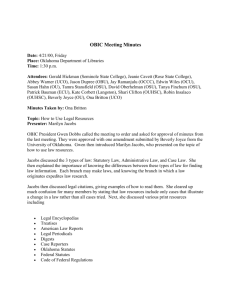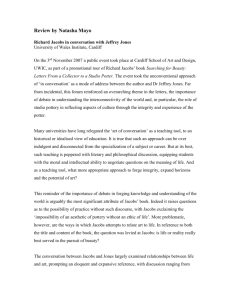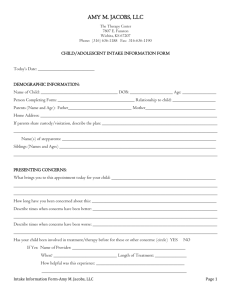Written by Herself: Harriet Jacobs' Slave Narrative
advertisement
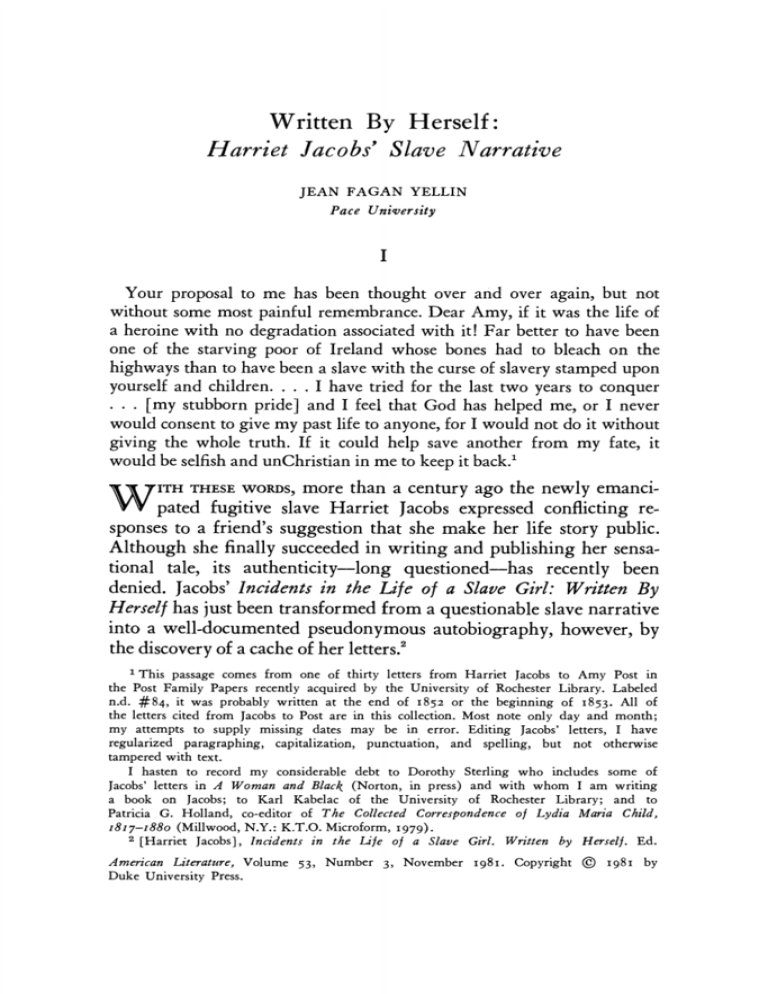
WrittenBy Herself: Harriet Jacobs' Slave Narrative JEAN FAGAN YELLIN Pace University I Your proposalto me has been thoughtover and over again, but not withoutsome mostpainfulremembrance. Dear Amy,if it was thelifeof a heroinewithno degradationassociatedwithit! Far betterto have been one of the starvingpoor of Ireland whose bones had to bleach on the highwaysthanto havebeena slavewiththecurseofslaverystampedupon yourselfand children.. . . I have triedforthe last two yearsto conquer . . . [my stubbornpride] and I feelthatGod has helpedme, or I never wouldconsentto givemypastlifeto anyone,forI would notdo it without givingthe whole truth.If it could help save anotherfrommy fate,it wouldbe selfishand unChristian in me to keepitback.' Ay ITH THESE WORDS, more than a centuryago the newly emanci7pated fugitive slave Harriet Jacobs expressed conflictingre- sponses to a friend'ssuggestionthat she make her life storypublic. Although she finallysucceeded in writingand publishing her sensational tale, its authenticity-long questioned-has recently been denied.Jacobs'Incidentsin the Life of a Slave Girl: WrittenBy Herselfhas just been transformedfroma questionableslave narrative into a well-documentedpseudonymousautobiography,however,by the discoveryof a cache of her letters.2 1 This passage comes fromone of thirtylettersfromHarrietJacobsto Amy Post in the Post FamilyPapers recentlyacquiredby the University of RochesterLibrary.Labeled n.d. #84, it was probablywrittenat the end of I852 or the beginningof I853. All of the letterscitedfromJacobsto Post are in thiscollection.Most note only day and month; my attemptsto supply missingdates may be in error.Editing Jacobs'letters,I have regularizedparagraphing,capitalization,punctuation,and spelling, but not otherwise withtext. tampered I hastento recordmy considerabledebt to DorothySterlingwho includessome of Jacobs'lettersin A Womanand Black (Norton,in press) and with whom I am writing a book on Jacobs; to Karl Kabelac of the Universityof RochesterLibrary; and to PatriciaG. Holland, co-editorof The CollectedCorrespondence of Lydia Maria Child, I8I7-I880 (Millwood,N.Y.: K.T.O. Microform, I979). 2 [Harriet Jacobs],Incidentsin the Life of a Slave Girl. Writtenby Herself.Ed. American Literature, Volume 53, Number 3, November I98I. Duke University Press. Copyright ? I98I by 480 AmericanLiterature establishes andclarifies the Jacobs' authorship Thiscorrespondence us witha newperspective In doingso,itprovides roleofhereditor. of nineteenth-century writers-Nathaniel on an unlikely grouping C. and L. Maria William Beecher Nell, Stowe, P. Willis,Harriet us witha our literary history by presenting Child-and enriches blackwomanto of theefforts of an underclass uniquechronicle America. in antebellum writeandpublishherautobiography II totraceher hasmadeitpossible The appearance ofJacobs' letters life.She was bornnearEdenton,NorthCarolina,abouti8i5. In diedwhileshewasa child,and shewrites thatherparents Incidents, thatat thedeathof herbelovedmistress (who had taughtherto He subjected master. readand spell) shewas sentto a licentious In her she teens boretwo sexualharassment. herto unrelenting threatened whiteman.Whenherjealousmaster children toanother black ranaway.Aidedbysympathetic Jacobs herwithconcubinage, andforyears byherfamily shewas sheltered andwhiteneighbors, a freedslave. hiddenin thehomeof hergrandmother, remained whohad boughtthem ofherchildren, Duringthistimethefather fromher master,allowedthemto live withher grandmother. girltoa freestate, hefailedtokeep Although laterhetooktheirlittle thechildren. hispromise toemancipate her escapedNorth,contacted AboutI842, HarrietJacobsfinally wasjoinedbyherson,andfoundworkinNewYorkCity. daughter, oflitterateur Becausethebabyshewashiredtotendwasthedaughter N. P. Willis,ithasbeenpossible topieceouttouseWillis'materials In I849 shemovedto Rochester, andto corroborate-Jacobs' story.3 New York,wheretheWomen'sRightsConvention had recently metandwhereFrederick Douglass'NorthStarwasbeingpublished L. Maria Child (Boston: For the Author, i86i). An English edition appeared the followingyear: [HarrietJacobs],The Deeper Wrong: Or, Incidentsin the Life of a Slave Girl. Writtenby Herself.Ed. L. Maria Child. (London: W. Tweedie, I862). ExaminingIncidentsin a discussionof "fictionalaccounts. . . in which the major charactermay have been a real fugitive,but the narrativeof his life is probablyfalse," JohnBlassingamerecentlyjudged that "the work is not credible."See The Slave Community(New York:OxfordUniv.Press,I972), pp. 233-34. 3 Willis referredto Jacobsdirectly-thoughnot by name-in a House and Home columnreprinted in Outdoorsat Idlewild (New York: Scribner's,I855), pp. 275-76. Notes 481 each week. With her brother,a fugitiveactivein the abolitionist movement,she ran an antislavery readingroom and met other reformers. Jacobsmade theRochesterQuakerAmyPost,a feminist and abolitionist, her confidante;her lettersto Post date fromthis period.In September I850 Jacobs returned toNew Yorkand resumed workin theWillishousehold.When shewas again houndedby her owner,she and her childrenwere purchasedand manumitted by Willis. It was following this-between I853 and I858-that Jacobs acquiescedto Post's urgings;aftera brushwith HarrietBeecher Withthehelpof Stowe,shewroteoutthestoryofherlifebyherself. black abolitionistwriterWilliam C. Nell and white abolitionist woman of lettersL. Maria Child (whose correspondence, too,corroborates was finallypublishedearlyin i86i.4 Jacobs'),hernarrative As thenationalcrisisdeepened,Jacobsattempted to swellsentiment forEmancipationby publicizingand circulating her book. During theCivilWar shewentto Washington, D.C., to nurseblacktroops; she later returnedSouth to help the freedmen.Jacobsremained activelyengagedforthenextthirty years.She died at Washington, D.C., in I897. III The primaryliterary of HarrietJacobs'lettersto Amy importance Post is thattheyestablishher authorshipof Incidentsand define theroleof hereditor,L. Maria Child.They also yielda fascinating accountof theexperiences of thisunderclassblackfemaleautobiographerwithseveralantebellum writers. Jacobs'letters expressherconviction that,unlikebothhis firstand his secondwife,NathanielP. Williswas "pro-slavery," and writings likehispicturesque I859 accountofslavelifeentitled "NegroHappiness in Virginia"musthave confirmed her judgment.5Because of 4Nell reviewedIncidentsin The Liberator,25 Jan. I86i. Otherreviewsinclude The I3 April Standard,23 Feb. I86I, and The WeeklyAnglo-African, NationalAnti-Slavery are citedbelow. I86i. RelevantpassagesfromChild'scorrespondence 5For Jacobson Willis,see Jacobsto Post, Cornwall,Orange County(late i852-early with Willis in a letterto i853?) n.d. #84. Child commentedon Jacobs'relationship JohnG. Whittierdated 4 April I86i, now in the Child Papers,ManuscriptDivision,the Libraryof Congress.Willis' articlewas anthologizedin The Convalescent(New York: I859), pp. 40O-I6. Scribner's, 482 American Literature she repeatedly this-although soughthelp to win the timeand introductions to publicfigures and evenrequested privacy towrite, ofherbook-Jacobs thepublication in hopethattheywouldeffect consistently refused toaskforWillis'aid.Shedidnotevenwanthim whilelivingunderhisroof, Foryears, toknowthatshewaswriting. sheworked onherbooksecretly andatnight. Her briefinvolvement withHarrietBeecherStowewas decisive WhenJacobsfirstagreedto a public in thegenesisof Incidents. accountofherlife,shedidnotplantowriteit herself, buttoenlist a dictated narrative. To thisend, Stowe'said inhelpingherproduce JacobsaskedPostto approachUncleTom'screator withthesuggestion thatJacobs be invited toStowe'shomeso theycouldbecome inthepapersoftheauthor's acquainted. Then,reading plantotravel write Mrs. Willis thatStowe abroad,Jacobs persuaded to suggesting herto Englandas a permit Jacobs' daughter Louisato accompany "representative southern slave." HarrietBeecherStoweevidently responded by writingto Mrs. WillisthatshewouldnottakeJacobs'daughter withher,by forsketch Mrs. of sensational lifefor wardingto WillisPost's Jacobs' use verification, and by proposing thatif it was true,she herself Jacobs' story in TheKeytoUncleTom'sCabin,whichshewasrushingtocomplete. Reporting all ofthistoPost,Jacobs suggests thatshe as a feltdenigrated as a mother, betrayed as a woman, andthreatened writer byStowe'saction. [Mrs.Stowe]saidit wouldbe muchcareto herto takeLouisa.As she wentbyinvitation, it wouldnotbe right, and shewas afraidthatif . . . [Louisa's]situation as a slaveshouldbe known,it wouldsubjectherto muchpetting andpatronizing, whichwouldbe morepleasing to a young girl thanuseful;and the Englishwere veryapt to do it, and . . . [Mrs. Stowe]was verymuchopposedto it withthisclassof people.... . I hadneveropenedmylifetoMrs.Willisconcerning mychildren. It embarrassed meat first, butI toldherthetruth;butwe boththought it wrongin Mrs.Stoweto havesentyourletter. She mighthavewritten toinquireifsheliked. Mrs.Williswrotehera verykindletterbeggingthatshe wouldnot useanyofthefactsinherKey,sayingthatI wishedittobe a history ofmy lifeentirely which would do more and it neededno by itself, good, butifshewantedsomefactsforherbook,thatI wouldbe most romance; Notes 483 happytogivehersome.She neveranswered theletter. She [Mrs.Willis] wroteagain,andI wrotetwice, withnobetter success. I think shedidnotlikemyobjection. I can'thelpit.6 Jacobs laterexpressed herracialoutrage:"Think,dearAmy,thata visitto Stafford House would spoilme,as Mrs.Stowethinkspetting is morethanmy race can bear? Well, what a pitywe poor blacks can't have the firmness and stabilityof characterthat you white people have !"' Jacobs'distrust of Willis and disillusionment withStowecontrast withherconfidence in William C. Nell and L. Maria Child. After the Stowe episode,Jacobsdecided to writeher storyherself.She spentyearson themanuscript and,whenit was finished, moreyears tryingto get it publishedin England and America.Finally,in a letterspellingoutthecostofherlack of an endorsement fromWillis or Stowe,she reportedto Post thatNell and Child were helping arrangeforthepublication ofherautobiography. Difficulties seemedto thicken,and I becamediscouraged.. . . My manu- script wasreadat PhillipsandSampson. Theyagreedtotakeit ifI could getMrs.Stoweor Mr.Willisto writea preface forit.The former I had thesecondclinch[?] from,and thelatterI wouldnotask,and before anything wasdone,thisestablishment failed.So I gaveup theeffort until thisautumn[when]I sentit to Thayerand Eldridgeof Boston.They werewillingtopublishitifI couldobtaina preface fromMrs.Child.... I had neverseenMrs.Child.Pastexp'erience mademe tremble at the thoughtof approaching anothersatelliteof so greatmagnitude . .. [but] through W. C. Nell's readykindness, I metMrs. Child at the antislavery office. Mrs.C. is likeyourself, a whole-souled woman.We soon foundthe way to each other'sheart.I will send you some of her letters.. . 6 My discussionof Jacobsand Stowe is based on five lettersfromJacobsto Post: Cornwall,Orange County(late 1852-earlyI853?) n.d. #84; 14 Feb. (i853?); 4 April (i853?); New Bedford,Mass. (Spring, i853?) n.d. #80; 3I July (i854?) n.d. #88. The lengthyquotationis fromJacobsto Post, 4 April (i853?). I have been unable to locateany lettersto Stowe fromPost,CorneliaWillis,or Jacobs,or fromStowe to Cornelia Willis. 7 Jacobs to Post,New Bedford, Mass. (Spring,i853?) n.d. #80. 8Jacobsto Post, 8 Oct. (i86o?). I have not been able to documenta second attempt to gain Stowe's backing. Jacobsdiscussesher effortsto publish her book abroad in lettersto Post dated 2I June (i857?) n.d. #go; New Bedford,9 August (0957?); I March(i858?); and Cambridge, 3 May (i858?) n.d. #87. 484 American Literature thiscorrespondence are two lettersfromL. Maria Accompanying Child to Harriet Jacobs.These, I believe,resolvethe questions historianshave repeatedlyraisedconcerningthe editingof Jacobs' manuscript. Child beginsthefirstby describing hereditorialproceduresin muchthesame way she laterdiscussedthemin her IntroductiontoIncidents. I havebeenbusywithyourM.S. eversinceI saw you;and haveonly doneone-third ofit.I haveverylittleoccasion toalterthelanguage, which is wonderfully good,forone whoseopportunities foreducationhave beenso limited. The eventsare interesting, and well told;theremarks are also good,and to thepurpose.But I am copying a greatdeal of it, forthepurposeof transposing sentences and pages,so as to bringthe storyintocontinuous order,and the remarks intoappropriateplaces. I thinkyouwill see thatthisrendersthestorymuchmoreclearand entertaining. Child's second letteris a detailedexplanationof the publisher's contract.9 Jacobs'lettersare also of value in providinga unique running accountof the efforts of this newlyemancipatedAfro-American woman to produceher autobiography. Afterdecidingto writethe manuscript herself, she followedthelong-standing practiceof sending apprentice piecesto thenewspapers. In styleand in subject,her firstpublicletterreflects her privatecorrespondence and prefigures herbookbyusingthelanguageofpolitelettersto discussthesexual exploitation of womenin slavery.Jacobsbeginswithan announcementof her newlyfounddetermination to tell her tale by herself. Then-as in theletters and thebook-she expresses thepain shefeels as sherecallsand writesaboutherlife. Poor as it maybe, I had rathergive. [my story]frommy own hand,thanhave it said thatI employedothersto do it forme. . .. 9 Child to Jacobs,Wayland, I3 August i86o; and Wayland, 27 Sept. i86o. Any remainingdoubts concerningChild's role must, I think,rest on an undated plea for secrecyfrom Jacobsto Post: "Please let no one see these letters.I am pledged to Mrs. Child thatI will tell no one what she has done,as she is besetby so manypeople, and it would affectthe book. It mustbe the slave'sown story-whichit trulyis." To my mind,this reflects an effortto shield Child frominterruption while she edits the manuscript,not an attemptto hide editorialimproprieties. Also see Child to Lucy [Searle], 4 Feb. i86i in the Lydia Maria Child Papers,Anti-Slavery Collectionof CornellUniversity Libraries. Notes 485 I was borna slave,raisedin the Southern hot-beduntilI was the oftwochildren, mother soldat theearlyage of twoand fouryearsold. I havebeenhuntedthrough all of theNorthern States-butno, I will nottellyouofmyownsuffering-no, it wouldharrow up mysoul... Encouraged bythepublication ofthisletter, comJacobssecretly posedothers. Hercorrespondence duringthisperiodreveals thatshe wasatoncedetermined towrite, apprehensive aboutherability todo so,andfearful ofbeingdiscovered: "No onehereeversuspected me [of writingto the Tribune].I would not have Mrs.W. to know it beforeI had undertakenmy history, forI mustwritejust what I have lived and witnessedmyself.Don't expectmuch of me, dear Amy.You shallhavetruth, butnottalent."" The lettersrecordotherpressures. During the yearsJacobscomposedherextraordinary memoirs, Mr.and Mrs.Willismovedintoan eighteen-room estateand added two morechildrento theirfamily; Jacobs'workload increasedaccordingly. Writingto Post,she voiced the frustrations of a would-bewriterwho earnedher livingas a nursemaid:"Poor Hatty'snameis so muchin demandthatI cannot accomplishmuch;ifI couldstealawayand havetwoquietmonthsto myself, I would worknightand day thoughit shouldall fallto the ground."She wenton,however,to saythatshepreferred theendless interruptions to revealingherprojectto heremployers:"To getthis timeI shouldhaveto explainmyself, and no one hereexceptLouisa knowsthatI have everwrittenanythingto be put in print.I have not the courage to meet the criticismand ridiculeof educated people."'2 Her distressaboutthe contentof her book was even worsethan herembarrassment aboutitsformalflaws.As hermanuscript neared completion, JacobsaskedPost to identify herselfwiththebook in a letterexpressingher concernabout its sensationalaspectsand her need fortheacceptanceof anotherwoman: "I have thoughtthatI wantedsomefemalefriendto writea prefaceor someintroductory remarks . . . yet believe me, dear friend, there are many painful 10 "Letter From a Fugitive Slave," New York Tribtine, 2I June i853. Jacobs' second letterappeared on 25 JulyI853. 11 Jacobs to Post, 9 Oct. (i853?) n.d. #85. Also see Jacobs to Post, Cornwall, 25 June (i853?). 12 Jacobsto Post, Cornwall, i I Jan. (I 854 ?) . 486 American Literature thingsin . . . [mybook] thatmakeme shrinkfromaskingthe onesogoodandpureasyourself."13 sacrifice from IV WhileIncidents thegeneralcharacteristics of theslave embodies narrative, it has long been judged a peculiarexampleof this Americangenre.It is not,like most,the storyof a lifebut,as its titleannounces,of incidentsin a life.Like othernarrators, Jacobs assertedherauthorship in hersubtitle, wrotein thefirstperson,and addressedthe subjectof the oppressionof chattelslaveryand the strugglefor freedomfromthe perspective of one who had been enslaved.Butin hertitlesheidentified herselfbygender,and in her textaddresseda specificaspectof thissubject.Incidentsis an account by a woman of her struggleagainsther oppressionin slaveryas a sexualobjectand as a mother.Thus it presentsa doublecritiqueof ournineteenth-century ideasand institutions. It inevitably challenges notonlytheinstitution ofchattelslaveryand itssupporting ideology of whiteracism;it also challengestraditional patriarchal institutions and ideas. Publicationofthisbook marked,I think,a uniquemomentin our Incidentsdefiedthetaboosprohibiting literary history. womenfrom discussingtheirsexuality-muchless theirsexual exploitation-in print.Withinits pages,a well-knownwoman writerpresentedto the publicthe writingof a pseudynomous "impurewoman" on a "forbiddensubject." Here a black American woman, defying barriersof caste and class,defyingrules of sexual propriety, was joinedby a whiteAmericanwoman to make herhistoryknownin an attemptto effectsocial change.It is ironicthatthis narrative, whichwas painfullywrittenin an effort to give "thewhole truth," has been brandedfalse.Now thatthe discoveryof HarrietJacobs' has established thatherbook was indeed Written letters By Herself, we can reexamineitsplacewithinwomen'swritings, Afro-American and thebodyofournationalletters. literature, 13 Jacobs to Post, I8 May and 8 June (i857?). Post's signed statement in the Appendix to Incidents was writtenin response to this request.
